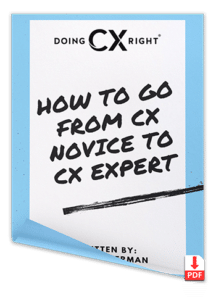Measuring customer satisfaction and identifying “pain points” for improvement is common practice at nearly all best-in-class companies. While there’s no question about the importance of customer experience (CX) and employee (EX) too, there is a debate about WHICH metric is best and HOW to apply it within organizations. Should it be NPS or something else?
The Wallstreet Journal published an interesting article about Net Promoter Score and whether or not it is misleading. The question about “Should NPS Scores Be Tied To Employee Bonuses” is controversial. I believe there are valid reasons for and against it. Below is a summary so you can form your own opinion. There’s no one right or wrong answer.
6 ADVANTAGES OF LINKING NPS TO EMPLOYEE COMPENSATION:
- Drives employee accountability to deliver customer excellence. Employees at all levels take customer satisfaction more seriously when they have “skin in the game.”
- Creates a customer-obsessed culture. It’s a proven tactic.
- Sends a message to employees that customer loyalty matters. It demonstrates that the company is “walking the CX talk” and not just saying the words in a mission statement.
- Measures customer perceptions in a meaningful way and everyone contributes to it, more than traditional methods like “share of eyeball.” NPS is good for benchmarking purposes too.
- Serves as an employee motivator. Incentives drive behavior.
- Leads to faster employee follow up with customers. Helps drive “closed loop” compliance.
6 REASONS AGAINST IT. The flip-side:
- Data can be unreliable. People inevitably learn to influence the numbers and beg for high scores, thereby corrupting the system. It defeats the purpose when employees bribe customers for a high satisfaction rating.
- Employee Satisfaction Matters More. If employees are happy and loyal, then customer satisfaction will inevitably happen.
- Net Promoter Score is too limiting. NPS does not include key drivers of WHY customers will or will not recommend a company.
- Surveys aren’t always administrated fairly. Bias is a concern. There’re companies that don’t police the data or have an impartial client advocate leading the survey process.
- Incentivizing leads employees becoming too concerned with the score. It creates an environment where they focus on the numbers instead of delighting customers.
- Creates an unfriendly work environment when it’s unclear WHO’S responsible for a detractor (and promoter) score. The value of a score and customer comments gets lost in “blame” and “glory” games.
My NPS Perspective:
I have worked in organizations where NPS scores were tied to Executives and my CX teams’ objectives and paychecks. I’ve also been at companies where ALL employees were held accountable for customer experience metrics. While I understand both sides of the debate, my opinion is that the pros of linking NPS to EVERYONE’S compensation outweigh the cons, with a few considerations.
- Company leaders must communicate and educate employees about why and how the NPS score is calculated, so they understand it is a credible metric and trust the process. Employee buy-in goes a long way.
- Reinforce that everyone owns the customer experience (CX) just like other financial results. Keep the drumbeat going so employees put customers first, even when their boss isn’t looking. I recommend including CX topics on every meeting agenda. Celebrate the good scores (promoters) and problem solve (detractors) to reduce churn. Read more about building a customer-centric culture.
- Use a third party or unbiased internal team to conduct surveys across the customer journey to eliminate questions about validity and unfairness.
What are your views about linking employee paychecks to NPS as well as other customer satisfaction metrics? Are you in favor or against it, and why? Please comment below as your opinion matters.


